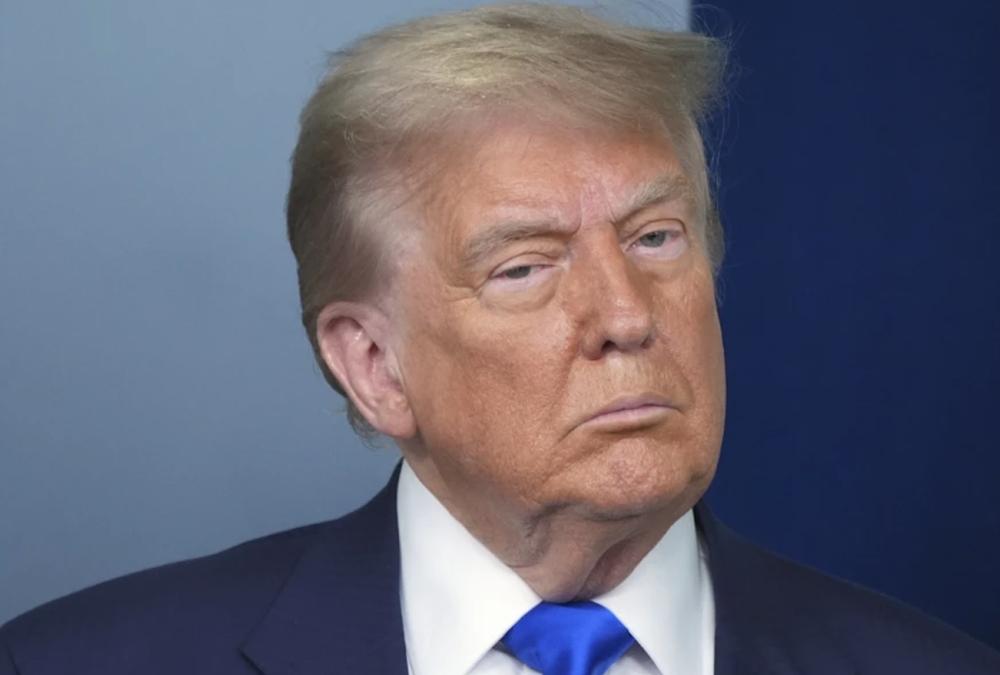Trump signs order lifting Syria sanctions, to review HTS designation
Syria’s transitional government has been lobbying the US for sanctions relief for months.
-

US President Donald Trump listens during a briefing with the media, on June 27, 2025, at the White House in Washington (AP)
US President Donald Trump on Monday signed an executive order officially terminating the US sanctions program on Syria, marking a major shift in US foreign policy.
The move allows Syria to reconnect with the international financial system and follows Trump’s May announcement in Riyadh that the US would support Syria’s post-war recovery.
White House spokeswoman Karoline Leavitt confirmed that sanctions will remain in place against Syria’s ousted former president Bashar al-Assad, his associates, human rights abusers, drug traffickers, individuals involved in chemical weapons activities, the Islamic State, and "Iran proxies".
US Special Envoy for Syria Thomas Barrack described the executive order as "the culmination of a very tedious, detailed, excruciating process" aimed at responsibly unwinding the sanctions program.
"Syria needs to be given a chance, and that's what's happened," he said.
Syria welcomes Trump's decision
On the social media platform X, Syrian Foreign Minister Asaad al-Shaibani welcomed the decision, saying Trump's decision would "open door of long-awaited reconstruction and development."
نُرحب بإلغاء الجزء الأكبر من برنامج العقوبات المفروضة على الجمهورية العربية السورية، بموجب القرار التنفيذي التاريخي الصادر عن الرئيس ترامب، يمثل هذا القرار نقطة تحول مهمة من شأنها أن تُسهم في دفع سوريا نحو مرحلة جديدة من الازدهار والاستقرار والانفتاح على المجتمع الدولي.
— أسعد حسن الشيباني (@AsaadHShaibani) June 30, 2025
He stated that lifting the US sanctions would remove a key obstacle to economic recovery and open Syria to broader international engagement.
This came after CBS News reported, citing two sources familiar with the matter, that Trump is expected to sign an executive order soon to ease sanctions on Syria.
The anticipated move follows Trump’s May announcement during a trip to the Middle East that the US would unwind the measures to help Syria rebuild. During the visit, he met with Syrian President Ahmad al-Sharaa, who had announced a transitional government in March after the ouster of the al-Assad government.
Syria’s transitional government has been lobbying the US for sanctions relief for months, and steps toward easing restrictions had already begun prior to Trump’s public commitment in May.
White House sets conditions for future engagement
The White House stated that it would monitor Syria’s progress on several key priorities, including normalizing ties with "Israel", addressing foreign terrorist activity, and deporting and banning Palestinian Resistance groups.
A White House fact sheet also directed the Secretary of State to review terrorism designations of Hay'at Tahrir al-Sham, the group previously led by al-Sharaa, due to its historical affiliation with al-Qaeda.
Caesar Act under review
Despite the executive order, many US sanctions remain in effect due to legislative mandates like the Caesar Act. According to a senior administration official, the executive order directs a review of suspension criteria for the Caesar Act as part of broader efforts to dismantle layers of US-imposed sanctions.
Most current sanctions stem from measures taken in 2011, following the eruption of the war in Syria. Monday’s order revokes executive orders linked to a national emergency declared in 2004 and includes additional waivers for export controls and restrictions.
Relief already underway
While some sanctions, particularly those dating back to Syria’s 1979 designation as a "state sponsor of terrorism," would require Congressional action to be fully lifted, the Treasury Department has already begun rolling back specific measures. Last month, it issued guidance easing sanctions on Syrian banks, airlines, and President al-Sharaa himself and outlined permitted transactions in sectors such as infrastructure.
Treasury Secretary Scott Bessent said the changes are aimed at encouraging foreign investment and supporting Syria’s reconstruction.
Bessent detailed how the Treasury Department and State Department are "implementing authorizations to encourage new investment into Syria," adding that "Syria must also continue to work towards becoming a stable country that is at peace, and today's actions will hopefully put the country on a path to a bright, prosperous, and stable future."
State struggles linked to sanctions
The new transitional government in Syria has attributed its struggles to pay civil servants, rebuild war-torn cities, and restore the collapsed healthcare system largely to the ongoing international sanctions. These include penalties targeting third countries that engage in business with Syria, severely limiting the government's access to resources.
Regional US allies Turkey and Saudi Arabia have supported efforts to normalize ties with Syria's new leadership. Both nations have provided humanitarian aid, and Saudi Arabia has even offered to help settle some of Syria’s outstanding debts—moves that could potentially violate existing sanctions.
Sanctions relief was a central topic during recent discussions between Syrian officials, such as Central Bank Governor Abdelkadir Husrieh, and global policymakers at the International Monetary Fund and World Bank spring meetings in Washington.

 5 Min Read
5 Min Read









